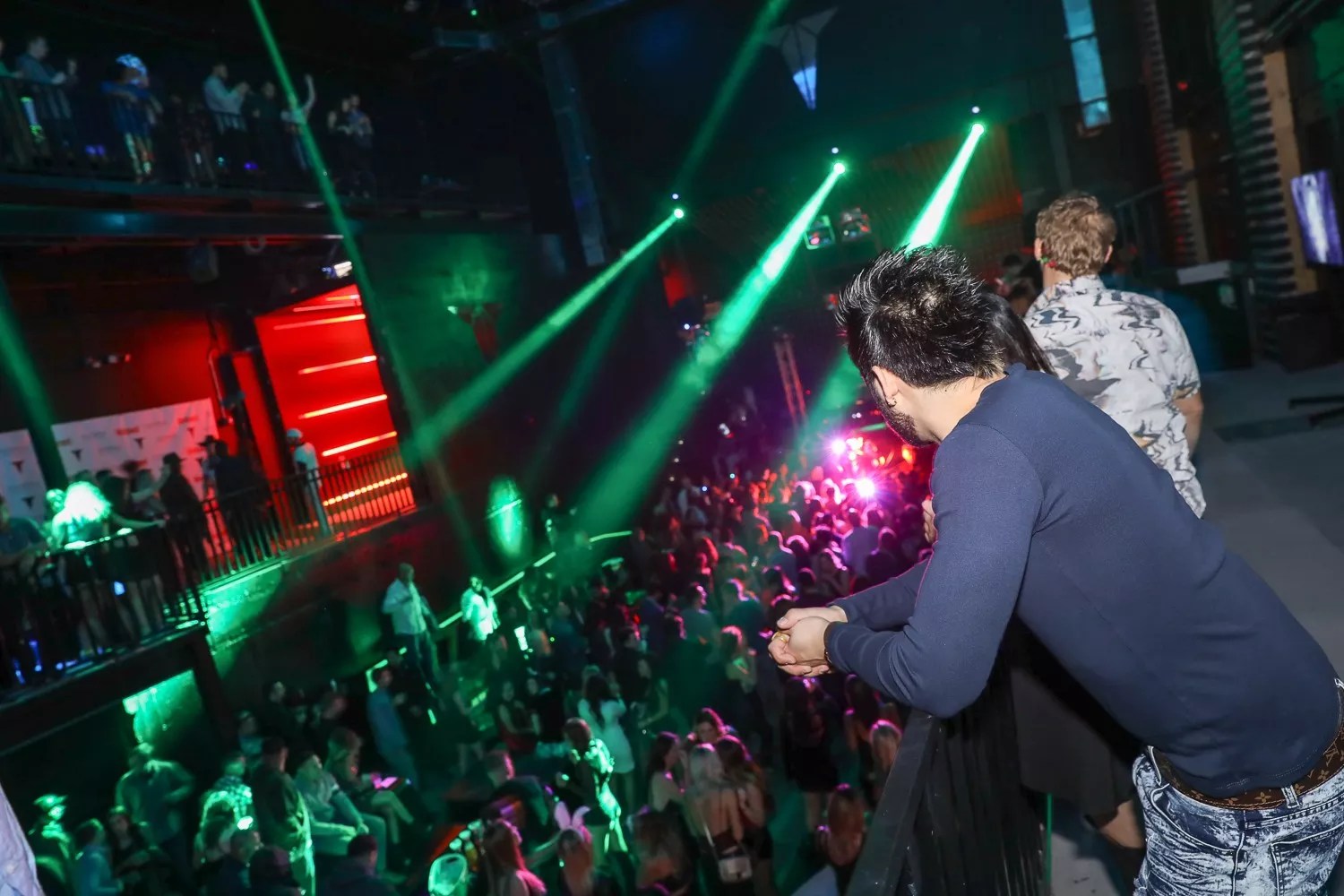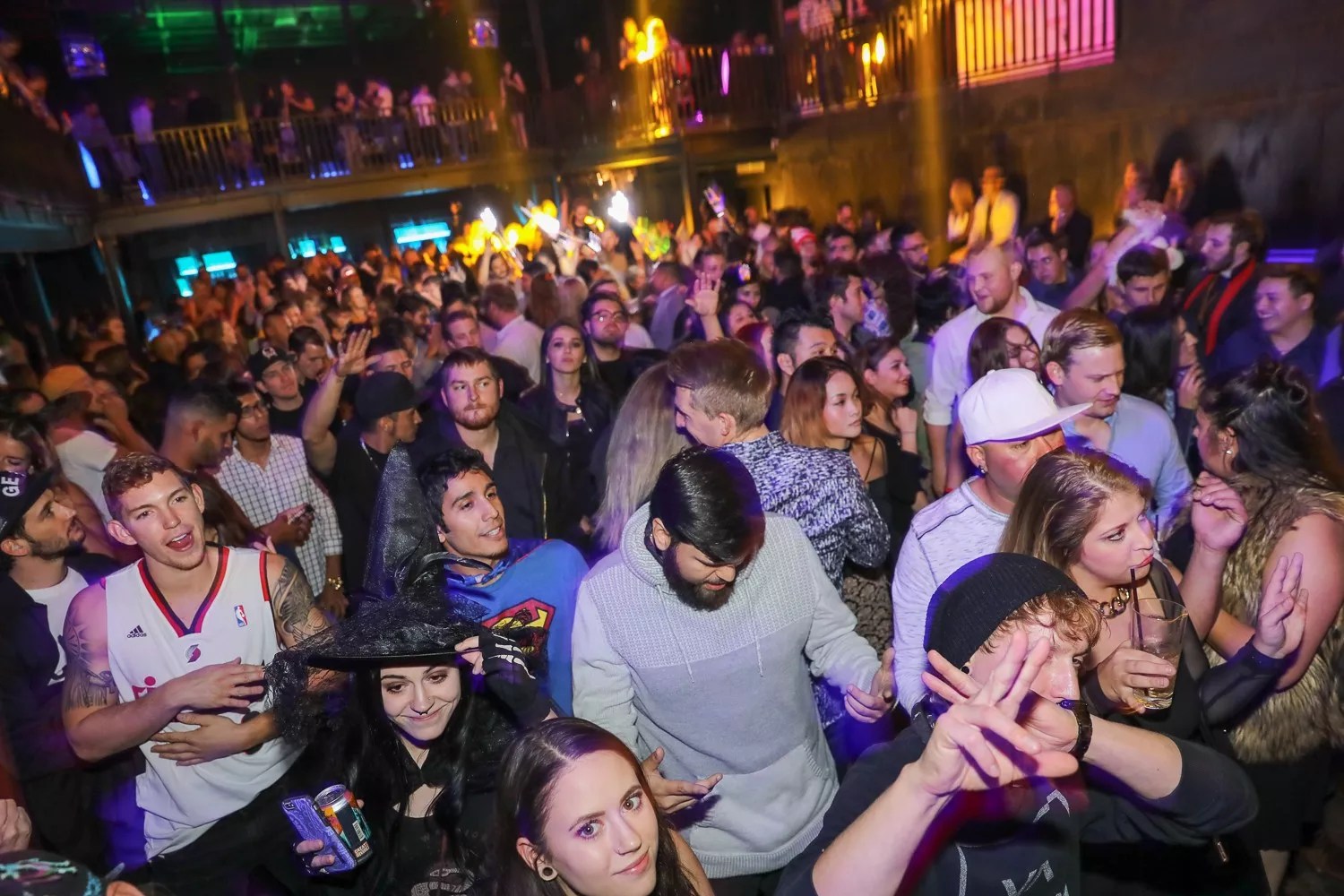
Chris Diesel

Audio By Carbonatix
Chris Diesel first saw the tag “The Arrival Is Near: TempleDenver.com” a few weeks ago, outside Trade, the bar where he works. The aerosol-chalk-stenciled ad was one of many sprayed around town heralding the arrival of Temple Denver, a high-end, Vegas-style nightclub transplanted from San Francisco, replete with bottle service and superstar EDM acts.
“I feel like this was a direct attack on our club,” says Diesel.
Trade wasn’t the only nightclub that found a Temple stencil outside its front door. The new club’s street team was aggressive and made its mark citywide.
The tags were part of Temple Denver’s “shotgun approach to marketing,” says founder Paul Hemming, a creative entrepreneur who started the project in San Francisco shortly after graduating from film school. Upbeat, he sees infinite possibility in Denver, a city he describes as “fertile soil” for a venue like his that synthesizes technology, music and the arts.
“In San Francisco, we’ve been building a model that’s the result of twenty years of evolution for me, personally, from a DJ to owning a record store,” says Hemming. “In the record store, we had a music studio, a label; we were throwing parties. We grew into Temple ten years ago, and then Temple went through all these transformations. I used Temple as the incubator to fuel all these component parts. We expanded the label. We opened co-working space. We opened an art gallery. A couple restaurants have come and gone. We had a healing center. We’ve had rooftop gardens. We did a whole slew of different things in the attempt to perfect this model.
“I wouldn’t say it’s perfect yet, but we’ve reached a point where we were comfortable going through this cell-division process,” he continues. “We’ve had the unique challenge of saying: ‘Here’s the cell. Here’s the DNA. Let’s drop it into Denver.'”
Temple Denver is just the first part of a larger project, the Zen Compound, which will include a coffee shop, an art gallery and a co-working space serving music and tech companies.

Temple Denver on opening weekend.
Aaron Thackeray
The Denver iteration, the first of what Hemming hopes will be many outside San Francisco, was conceived in early 2017. By July, Hemming had signed a lease on the Broadway property where City Hall nightclub used to be, a building owned by Denver nightclub tycoon Regas Christou.
When time came to announce Temple’s arrival, the club’s marketing team thought stencils would be a smart way to spread the word.
“We were told that was a common practice in the city,” says Hemming. “I’d actually seen other nightclubs do that. But we would have never given specific instructions to put spray paint in front of any other nightclub. It was unfortunate, and I apologize for that. If it offended somebody, that wasn’t our intention.”
Diesel says it’s not just the tags that irk him, but the fact that they’re impossible to erase. His boss at Trade tried to clean up the stenciled ad with degreaser, Clorox and even a power sprayer. Nothing worked. Eventually, Diesel called Temple and asked the staff to clean it up. As he tells it, a guy came over and tried his best to wash it away.
“He was just sort of erratic,” Diesel says. “We just sat there videoing him scrubbing the sidewalk and laughing at him.”
The man left a smudge behind, says Diesel, who called the Denver Police Department, asking officers to take action against the nightclub. Denver police called Temple Denver; staff agreed to clean up the tags. Case closed.
But the stenciled ads aren’t the only Temple street-team strategy Diesel is blasting. “They’re targeting their competitors and sending people inside to pass out fliers, which is really not what you do,” says Diesel. “I’ve been working in clubs since the late ’90s, and I’ve never had another club do this kind of stuff.”
Hemming says his team wasn’t instructed to go into other clubs: “We’ve never had any shady business practices or any attempt to steal customers or anything like that.”
He does acknowledge that somebody took a photo of him in Beta nightclub handing out a Temple Denver promo flier to a customer. “We were at Beta, and someone asked me for a business card. I didn’t have a business card, so I gave them…a promotional card for girls,” he recalls. “I said, I don’t have a business card, but if you want to reach me, you can contact me here. Somehow that got twisted, and people have posted that photo. But that card was given to a guy that requested that. Categorically, no, we’ve never sent anybody to any nightclub to promote what we’re doing.”

Temple Denver on opening weekend.
Aaron Thackeray
Hemming says that Temple will have a bulletin board where other venues can promote their nights. He also plans to invite staff from other clubs for free bottle service, a practice he says is common in San Francisco. In short, he’s working to repair relationships and make sure his staff receives better mandates about what to do – and what not to do.
“We’ve employed over 100 people in the last 100 days,” Hemming says. “Sometimes when you hire that many people, it can be hard to control the actions of everybody. Sometimes people get a little overzealous. They get enthusiastic. And some people can get cocky and go around and maybe say things that aren’t on message for us. That’s a good way to summarize what happened in terms of the negative things that we’ve been accused of.”
Michael McCray, the executive director of operations and general manager at Beta took to Facebook, commenting on Temple’s promotions: “Honestly, there have been some things that Temple has done that go against the philosophy of our scene. And I can say, I’m not surprised. It would be challenging to come into a market that has been dominated by a group of people and not have your guns a-blazing. We are hoping this is the behavior of a few individuals, and not the company as a whole (which is my belief). And as such, there are no hard feelings for their efforts.”
Respected Denver DJ Kostas Kouremenos, who performs as Ecotek, landed a gig as one of two local resident DJs at Temple; local favorite J’Adore, whose husband works as Temple’s production manager, was the other.
Temple was “getting too much of a bad reputation with the spray-painting they were doing,” Kouremenos says, so he acted as an ambassador between the new club and the local electronic-music community. He promoted Temple, inviting his fans to the venue’s arrival party, where he promised to play for three hours.
Opening night came. Two hours into Kouremenos’s three-hour set, the stage manager told him a surprise DJ would be taking over. Temple talent buyer Josh Donaldson, who was emceeing, thanked Ecotek, told the crowd they could catch him every Saturday night, and handed the reins to the surprise DJ, a friend from Las Vegas, who had flown in unannounced from a Friday night show at Temple in San Francisco, wanting to be the first DJ to play both venues.
Kouremenos was left on stage, packing up his gear, utterly stunned.
“It was really embarrassing,” he says. “I’ve been doing this for 25 years…and I’ve never seen that happen.” The next day, Kouremenos took to social media, blasting Temple as a “huge disappointment” and pledging not to play there anymore.
“I’ve been in this city so long,” says Kouremenos. “I contribute. I do festivals. I felt like somebody walked in my house and disrespected me and humiliated me. Sitting on that stage, that’s how I felt.”
Hemming and Donaldson were both surprised to discover Kouremenos was upset.
“It’s just an unfortunate misunderstanding,” says Hemming. “Our resident DJs in San Francisco are always a flexible component of the machine…. The resident is kind of there to accommodate those needs. We had a surprise guest, which was one of our resident DJs. We asked if he could jump on for the last hour, and we didn’t think there was a problem.”
Donaldson adds, “I thought the transition was smooth, but maybe…it wasn’t communicated right. We were excited. It was opening night. We had a friend who was going to jump on. We were completely blindsided by what the outcome was. No disrespect to [Kouremenos] whatsoever.”
Zen Compound Property Tour: Mirus Gallery, ECO-SYSTM, and Temple Nightclub from Mirus Gallery on Vimeo.
Despite a bumpy arrival, Temple has been refreshing for many of Denver’s EDM fans. The club was at capacity opening weekend, says Hemming.
J’Adore, the other resident DJ and a friend of Kouremenos’s, says she’s having a “phenomenal” time at Temple and appreciates that the venue is giving Denver DJs an opportunity to play at home but also at the San Francisco club.
“They’re offering something that no other venue in the United States is offering for artists,” she says. “They’re really cultivating artists in their own walls and helping them grow.”
As for the online naysaying from other clubs and DJs, J’Adore says it’s irrelevant, that she doesn’t like the gossip, and that it’s unfair to take business disputes to social media before trying to work them out in person.
Ultimately, she says, local clubs are afraid of competition. “One of the reasons I’m personally excited for Temple is that the scene needs to be shaken up a little.”
Hemming says he’s learning a lot from launching in Denver, and while Temple has opened its main room, he plans to add two others, on top of all the offerings at the Zen Compound, which will roll out over the next few months, so there are plenty of lessons yet to come.
Whatever happens, he plans to take his newfound knowledge coupled with data he collects at the club to shape how he opens the next iteration of Temple, this one likely to land in Seattle.
“There are valuable lessons we’ve learned in this process,” Hemming says. “We’re going to learn and grow like we always do…. Our vision is to take this company around the world. Denver is the first city that we’ve chosen, and we’re learning valuable lessons about what to do and what not to do.”